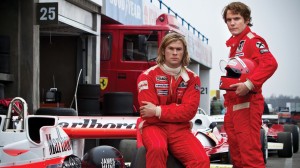Rush
Posted on September 26, 2013 at 6:00 pm
 The immensely gifted screenwriter Peter Morgan reunites with his “Frost/Nixon” director Ron Howard and returns to his favorite theme, a real-life drama about the clash between two brilliantly talented but flawed figures. This time it is the bitter rivalry between Formula One race car drivers James Hunt (“Thor’s” Chris Hemsworth) and Niki Lauda (“Inglourious Basterds'” Daniel Brühl). The British Hunt is Maverick to the Austrian Lauda’s Iceman, the Michael to his Sonny, the id to Lauda’s superego.
The immensely gifted screenwriter Peter Morgan reunites with his “Frost/Nixon” director Ron Howard and returns to his favorite theme, a real-life drama about the clash between two brilliantly talented but flawed figures. This time it is the bitter rivalry between Formula One race car drivers James Hunt (“Thor’s” Chris Hemsworth) and Niki Lauda (“Inglourious Basterds'” Daniel Brühl). The British Hunt is Maverick to the Austrian Lauda’s Iceman, the Michael to his Sonny, the id to Lauda’s superego.
Both were the rebellious sons of wealthy fathers. Hunt is handsome, careless, and catnip to the ladies. “He will have you pulling your hair out nine days out of ten,” a character says, but on the tenth day, when you need him, he will deliver. Lauda is methodical and analytical. He calculates the odds. But they both know that they are among the very few who know what it feels like to get into a car that is essentially a bomb on wheels and speed it around a racetrack. They both do it not because they like driving in circles but because they like to test themselves. They both like to win, even need to win. And, as they remind us perhaps one or two times too many in this film, they both know that the best way to do that is to compete against one another. “The only people I can get along with are those who can drive fast,” Hunt says. He does not really get along with them, either.
Hemsworth, 30 pounds lighter than his Thor/Avengers muscled-up Norse god look, is able to make Hunt magnetic even in 70’s hair. We meet him as he walks into an emergency room with a bashed nose, not from a racing accident, from a jealous husband. The pretty nurse (Natalie Dormer) asks what he did to anger the husband and he rakishly offers to show her. The curtain rings squeal against the rod as it is quickly swung around and soon he is introducing her to his pit crew as “Nursie.” No time to learn her name, and no need.
Hunt was the James Bond of race car drivers, sexy, sophisticated, and fearless. But I don’t think James Bond ever threw up before a confrontation. “Rebels, lunatics, dreamers,” he tells us about race car drivers. “People who are desperate to make a mark and willing to die for it.” Formula One averaged two deaths a year. But, he adds, “The closer you are to death, the more alive you feel.”
Lauda says his brain is not that strong but his ass is very smart. He can tell from a car’s vibrations under the seat that a fan belt will be in trouble and which tire needs air. He negotiates his driving deals the way he drives, calmly but ruthlessly. He gets up early to walk the track. He calculates risk constantly and accurately. When he explains that one race should be called off because the heavy rainstorm has made conditions unsafe, Hunt, behind on points, persuades the other drivers to vote to continue. Lauda is very badly injured, including burns on his face and severe lung damage. In one of the most extraordinary comebacks in the history of sports, Lauda was back on the track 42 days later, against doctor’s orders but able to compete. In what passed for cheerfulness from the dour Austrian, he told the press that there was one advantage to the skin grafts on his forehead. They don’t sweat, so he would no longer be bothered by sweat dripping in his eyes. And, has his wife told him, you drive with your foot, not your face.
Howard conveys the pressure and the thrill of Formula One racing, giving us the view from inside the helmet, and showing us that Hunt’s air of casual mastery is accompanied by a nervous habit of playing with the cap on his cigarette lighter. He shows us how Hunt and Lauda are always racing, whether it is Hunt visualizing the track or Lauda walking it, competing for the best cars and sponsors, or exchanging barbed comments about whether it is more important to be feared than loved. The action is electrifying, on and off the track.
Parents should know that this movie includes some disturbing images of crashes and injuries, very strong language, sexual references and situations with nudity, drinking, smoking, and drug use, as well as a great deal of reckless behavior.
Family discussion: What were the most important ways in which Hunt and Lauda were alike? If you were a sponsor, which would you hire and why?
If you like this, try: “Winning” with Paul Newman, “Grand Prix” with James Garner, and “Le Mans” with Steve McQueen, and Peter Morgan’s “The Damned United” about another real-life sports rivalry.

One Reply to “Rush”
Comments are closed.